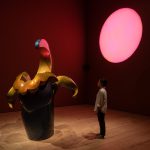Jala Wahid’s solo show at Baltic Centre for Contemporary Art, Gateshead is her first institutional exhibition and major new commission. Wahid’s work is innovative and touches on urgent issues in relation to identity, nationhood, diasporic living in the UK and migration, intergenerational connections and cultural traditions – key concerns that resonate within Baltic’s programme.
Wahid works with sculpture, film, sound, writing and installation. She is interested in the emotive potential of archives, music, literature, dance, theatre and fashion, to reveal the poetics and performativity of politics, whilst articulating the global and interregional politics that shape Kurdish identity. She considers how politics and poetic expression interweave and looks to embody this intertwining exploring the urgency, defiance, euphoria and violence and suggesting ways of being that belie essentialist definitions of identity. Her recent work is rooted in the London Kurdish Cultural Centre’s archive. She sees drawing on a community archive as a way of going beyond binary understandings of colonialism, instead, articulating the problematics of nationalism within a stateless people.
The exhibition presents a new body of work exploring the relationship between Britain and Kurdistan, through the lens of oil. Titled Conflagration, the project begins with the discovery of the Baba Gurgur oil well following a time during which Britain and France politically occupied Mesopotamia, culminating in the formation of new nation states and monopoly in the region’s oil resources. The project approaches oil as the symbolic material through which nationalism, statelessness, colonialism and Kurdish identity are explored.
Baba Gurgur is situated in the Kirkuk province, a contentious and disputed region that has oscillated between Iraqi and Kurdish control. This history and current politics will be explored through a sound work created from archival material found in the British National Archives, Anglo Persian Oil Company archives and Wahid’s late father’s published material. Wahid will collaborate with Amal Saeed Kurda, a well-known contemporary Kurdish singer/composer, to produce a funereal maqam, melodically Kurdish but lyrically English. The sound work will include other elements such as industrial machinery and sounds of oil refineries.
Conflagration centres around a single sculpture of the Salvia Spinosa flower, which is endemic to the region. Wahid presents it as the embodiment of the Baba Gurgur gusher when it was first struck in 1927. Baba Gurgur has been naturally burning for 4,000 years and its mythological and symbolic cultural history will also be explored. The Salvia Spinosa flower exists in abundance and is the only species of flora to be specifically described as ‘growing on shale rocks in-between oil wells at Baba Gurgur’. A new-to-science species of the Salvia plant was recently discovered in Kurdistan. The parallel of discovery of oil, flora and identity is important for Wahid. What makes discovery symbolic and what are its implications? At what or whose expense? In producing a single sculpture Wahid aims to play into the idea of monument.



